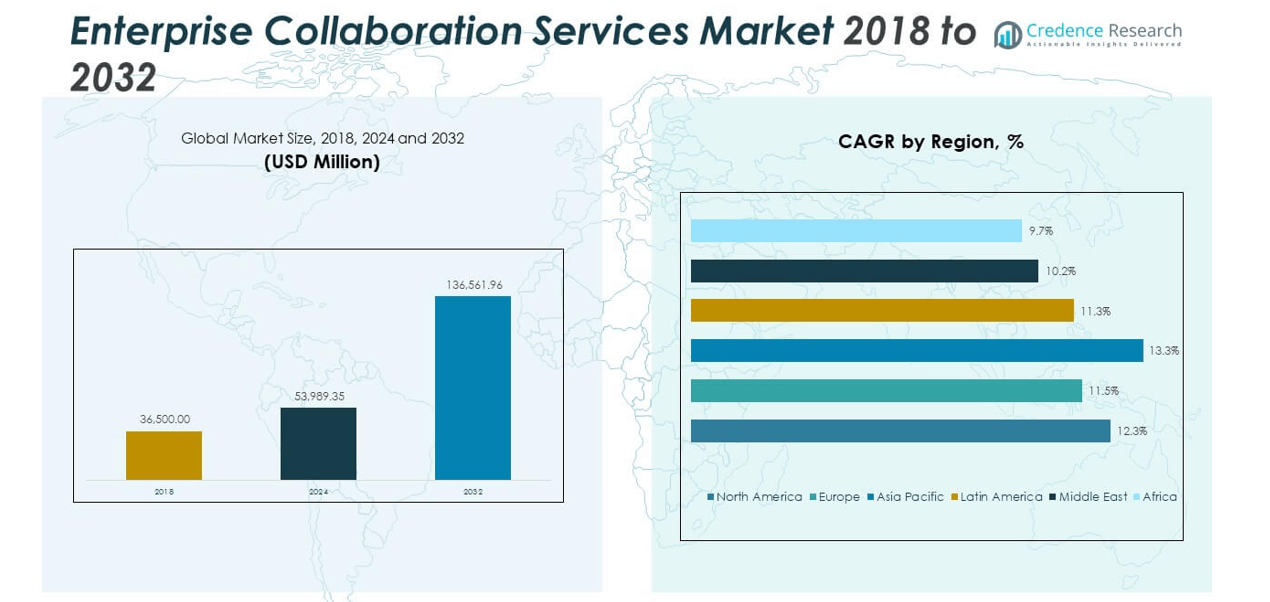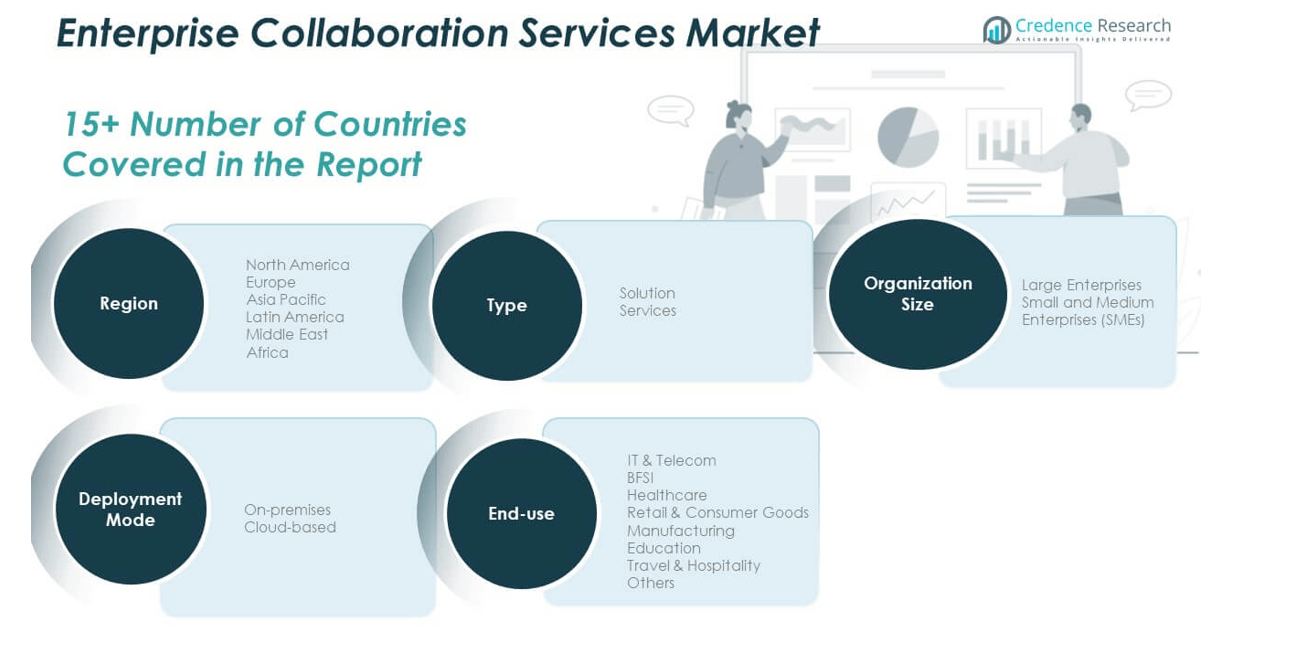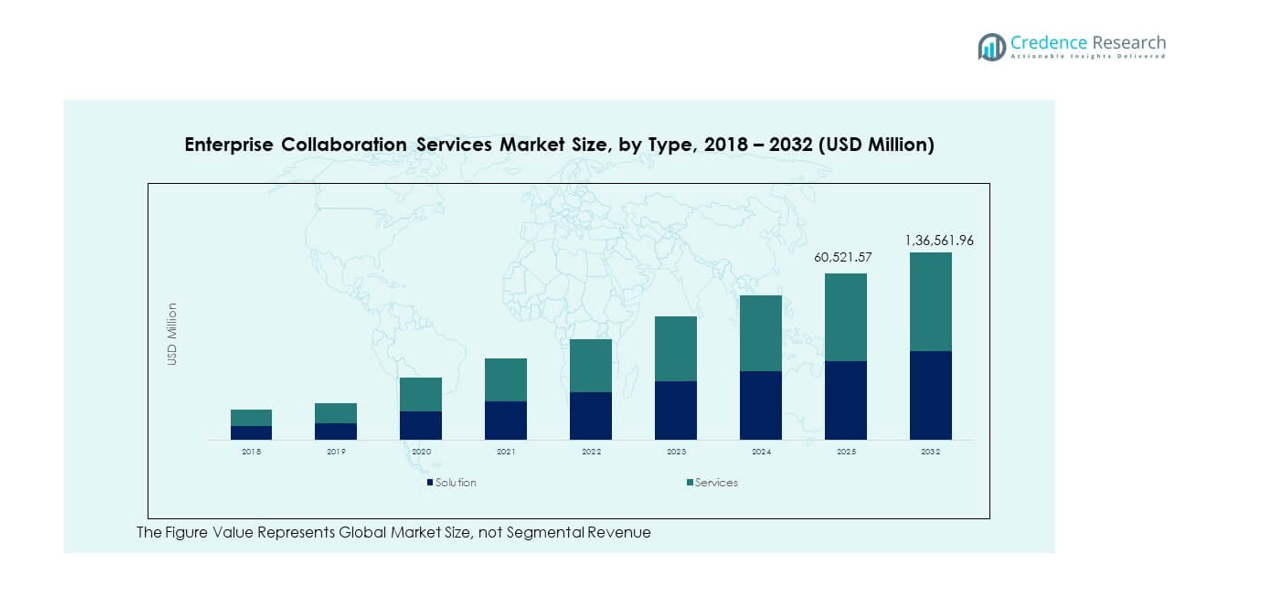CHAPTER NO. 1 : GENESIS OF THE MARKET
1.1 Market Prelude – Introduction & Scope
1.2 The Big Picture – Objectives & Vision
1.3 Strategic Edge – Unique Value Proposition
1.4 Stakeholder Compass – Key Beneficiaries
CHAPTER NO. 2 : EXECUTIVE LENS
2.1 Pulse of the Industry – Market Snapshot
2.2 Growth Arc – Revenue Projections (USD Million)
2.3. Premium Insights – Based on Primary Interviews
CHAPTER NO. 3 : ENTERPRISE COLLABORATION SERVICES MARKET FORCES & INDUSTRY PULSE
3.1 Foundations of Change – Market Overview
3.2 Catalysts of Expansion – Key Market Drivers
3.2.1 Momentum Boosters – Growth Triggers
3.2.2 Innovation Fuel – Disruptive Technologies
3.3 Headwinds & Crosswinds – Market Restraints
3.3.1 Regulatory Tides – Compliance Challenges
3.3.2 Economic Frictions – Inflationary Pressures
3.4 Untapped Horizons – Growth Potential & Opportunities
3.5 Strategic Navigation – Industry Frameworks
3.5.1 Market Equilibrium – Porter’s Five Forces
3.5.2 Ecosystem Dynamics – Value Chain Analysis
3.5.3 Macro Forces – PESTEL Breakdown
3.6 Price Trend Analysis
3.6.1 Regional Price Trend
3.6.2 Price Trend by product
CHAPTER NO. 4 : KEY INVESTMENT EPICENTER
4.1 Regional Goldmines – High-Growth Geographies
4.2 Product Frontiers – Lucrative Product Categories
4.3 Organization Size Sweet Spots – Emerging Demand Segments
CHAPTER NO. 5: REVENUE TRAJECTORY & WEALTH MAPPING
5.1 Momentum Metrics – Forecast & Growth Curves
5.2 Regional Revenue Footprint – Market Share Insights
5.3 Segmental Wealth Flow – Type & Organization Size Revenue
CHAPTER NO. 6 : TRADE & COMMERCE ANALYSIS
6.1. Import Analysis by Region
6.1.1. Global Enterprise Collaboration Services Market Import Revenue By Region
6.2. Export Analysis by Region
6.2.1. Global Enterprise Collaboration Services Market Export Revenue By Region
CHAPTER NO. 7 : COMPETITION ANALYSIS
7.1. Company Market Share Analysis
7.1.1. Global Enterprise Collaboration Services Market: Company Market Share
7.2. Global Enterprise Collaboration Services Market Company Revenue Market Share
7.3. Strategic Developments
7.3.1. Acquisitions & Mergers
7.3.2. New Product Launch
7.3.3. Regional Expansion
7.4. Competitive Dashboard
7.5. Company Assessment Metrics, 2024
CHAPTER NO. 8 : ENTERPRISE COLLABORATION SERVICES MARKET – BY TYPE SEGMENT ANALYSIS
8.1. Enterprise Collaboration Services Market Overview by Type Segment
8.1.1. Enterprise Collaboration Services Market Revenue Share By Type
8.2. Solution
8.3. Services
CHAPTER NO. 9 : ENTERPRISE COLLABORATION SERVICES MARKET – BY ORGANIZATION SIZE SEGMENT ANALYSIS
9.1. Enterprise Collaboration Services Market Overview by Organization Size Segment
9.1.1. Enterprise Collaboration Services Market Revenue Share By Organization Size
9.2. Large Enterprises
9.3. Small and Medium Enterprises (SMEs)
CHAPTER NO. 10 : ENTERPRISE COLLABORATION SERVICES MARKET – BY DEPLOYMENT MODE SEGMENT ANALYSIS
10.1. Enterprise Collaboration Services Market Overview by Deployment Mode Segment
10.1.1. Enterprise Collaboration Services Market Revenue Share By Deployment Mode
10.2. On-premises
10.3. Cloud-based
CHAPTER NO. 11 : ENTERPRISE COLLABORATION SERVICES MARKET – BY END-USE SEGMENT ANALYSIS
11.1. Enterprise Collaboration Services Market Overview by End-use Segment
11.1.1. Enterprise Collaboration Services Market Revenue Share By End-use
11.2. IT & Telecom
11.3. BFSI
11.4. Healthcare
11.5. Retail & Consumer Goods
11.6. Manufacturing
11.7. Education
11.8. Travel & Hospitality
11.9. Others
CHAPTER NO. 12 : ENTERPRISE COLLABORATION SERVICES MARKET – REGIONAL ANALYSIS
12.1. Enterprise Collaboration Services Market Overview by Region Segment
12.1.1. Global Enterprise Collaboration Services Market Revenue Share By Region
12.1.2. Regions
12.1.3. Global Enterprise Collaboration Services Market Revenue By Region
12.1.4. Type
12.1.5. Global Enterprise Collaboration Services Market Revenue By Type
12.1.6. Organization Size
12.1.7. Global Enterprise Collaboration Services Market Revenue By Organization Size
12.1.8. Deployment Mode
12.1.9. Global Enterprise Collaboration Services Market Revenue By Deployment Mode
12.1.10. End-use
12.1.11. Global Enterprise Collaboration Services Market Revenue By End-use
CHAPTER NO. 13 : NORTH AMERICA ENTERPRISE COLLABORATION SERVICES MARKET – COUNTRY ANALYSIS
13.1. North America Enterprise Collaboration Services Market Overview by Country Segment
13.1.1. North America Enterprise Collaboration Services Market Revenue Share By Region
13.2. North America
13.2.1. North America Enterprise Collaboration Services Market Revenue By Country
13.2.2. Type
13.2.3. North America Enterprise Collaboration Services Market Revenue By Type
13.2.4. Organization Size
13.2.5. North America Enterprise Collaboration Services Market Revenue By Organization Size
13.2.6. Deployment Mode
13.2.7. North America Enterprise Collaboration Services Market Revenue By Deployment Mode
13.2.8. End-use
13.2.9. North America Enterprise Collaboration Services Market Revenue By End-use
13.3. U.S.
13.4. Canada
13.5. Mexico
CHAPTER NO. 14 : EUROPE ENTERPRISE COLLABORATION SERVICES MARKET – COUNTRY ANALYSIS
14.1. Europe Enterprise Collaboration Services Market Overview by Country Segment
14.1.1. Europe Enterprise Collaboration Services Market Revenue Share By Region
14.2. Europe
14.2.1. Europe Enterprise Collaboration Services Market Revenue By Country
14.2.2. Type
14.2.3. Europe Enterprise Collaboration Services Market Revenue By Type
14.2.4. Organization Size
14.2.5. Europe Enterprise Collaboration Services Market Revenue By Organization Size
14.2.6. Deployment Mode
14.2.7. Europe Enterprise Collaboration Services Market Revenue By Deployment Mode
14.2.8. End-use
14.2.9. Europe Enterprise Collaboration Services Market Revenue By End-use
14.3. UK
14.4. France
14.5. Germany
14.6. Italy
14.7. Spain
14.8. Russia
14.9. Rest of Europe
CHAPTER NO. 15 : ASIA PACIFIC ENTERPRISE COLLABORATION SERVICES MARKET – COUNTRY ANALYSIS
15.1. Asia Pacific Enterprise Collaboration Services Market Overview by Country Segment
15.1.1. Asia Pacific Enterprise Collaboration Services Market Revenue Share By Region
15.2. Asia Pacific
15.2.1. Asia Pacific Enterprise Collaboration Services Market Revenue By Country
15.2.2. Type
15.2.3. Asia Pacific Enterprise Collaboration Services Market Revenue By Type
15.2.4. Organization Size
15.2.5. Asia Pacific Enterprise Collaboration Services Market Revenue By Organization Size
15.2.6. Deployment Mode
15.2.7. Asia Pacific Enterprise Collaboration Services Market Revenue By Deployment Mode
15.2.8. End-use
15.2.9. Asia Pacific Enterprise Collaboration Services Market Revenue By End-use
15.3. China
15.4. Japan
15.5. South Korea
15.6. India
15.7. Australia
15.8. Southeast Asia
15.9. Rest of Asia Pacific
CHAPTER NO. 16 : LATIN AMERICA ENTERPRISE COLLABORATION SERVICES MARKET – COUNTRY ANALYSIS
16.1. Latin America Enterprise Collaboration Services Market Overview by Country Segment
16.1.1. Latin America Enterprise Collaboration Services Market Revenue Share By Region
16.2. Latin America
16.2.1. Latin America Enterprise Collaboration Services Market Revenue By Country
16.2.2. Type
16.2.3. Latin America Enterprise Collaboration Services Market Revenue By Type
16.2.4. Organization Size
16.2.5. Latin America Enterprise Collaboration Services Market Revenue By Organization Size
16.2.6. Deployment Mode
16.2.7. Latin America Enterprise Collaboration Services Market Revenue By Deployment Mode
16.2.8. End-use
16.2.9. Latin America Enterprise Collaboration Services Market Revenue By End-use
16.3. Brazil
16.4. Argentina
16.5. Rest of Latin America
CHAPTER NO. 17 : MIDDLE EAST ENTERPRISE COLLABORATION SERVICES MARKET – COUNTRY ANALYSIS
17.1. Middle East Enterprise Collaboration Services Market Overview by Country Segment
17.1.1. Middle East Enterprise Collaboration Services Market Revenue Share By Region
17.2. Middle East
17.2.1. Middle East Enterprise Collaboration Services Market Revenue By Country
17.2.2. Type
17.2.3. Middle East Enterprise Collaboration Services Market Revenue By Type
17.2.4. Organization Size
17.2.5. Middle East Enterprise Collaboration Services Market Revenue By Organization Size
17.2.6. Deployment Mode
17.2.7. Middle East Enterprise Collaboration Services Market Revenue By Deployment Mode
17.2.8. End-use
17.2.9. Middle East Enterprise Collaboration Services Market Revenue By End-use
17.3. GCC Countries
17.4. Israel
17.5. Turkey
17.6. Rest of Middle East
CHAPTER NO. 18 : AFRICA ENTERPRISE COLLABORATION SERVICES MARKET – COUNTRY ANALYSIS
18.1. Africa Enterprise Collaboration Services Market Overview by Country Segment
18.1.1. Africa Enterprise Collaboration Services Market Revenue Share By Region
18.2. Africa
18.2.1. Africa Enterprise Collaboration Services Market Revenue By Country
18.2.2. Type
18.2.3. Africa Enterprise Collaboration Services Market Revenue By Type
18.2.4. Organization Size
18.2.5. Africa Enterprise Collaboration Services Market Revenue By Organization Size
18.2.6. Deployment Mode
18.2.7. Africa Enterprise Collaboration Services Market Revenue By Deployment Mode
18.2.8. End-use
18.2.9. Africa Enterprise Collaboration Services Market Revenue By End-use
18.3. South Africa
18.4. Egypt
18.5. Rest of Africa
CHAPTER NO. 19 : COMPANY PROFILES
19.1. Microsoft
19.1.1. Company Overview
19.1.2. Product Portfolio
19.1.3. Financial Overview
19.1.4. Recent Developments
19.1.5. Growth Strategy
19.1.6. SWOT Analysis
19.2. Cisco Systems, Inc.
19.3. Zoom Communications, Inc.
19.4. Google LLC
19.5. Salesforce, Inc.
19.6. SAP SE
19.7. Cloud Software Group, Inc.
19.8. Atlassian
19.9. Igloo Software
19.10. Zoho Corporation Pvt. Ltd.






